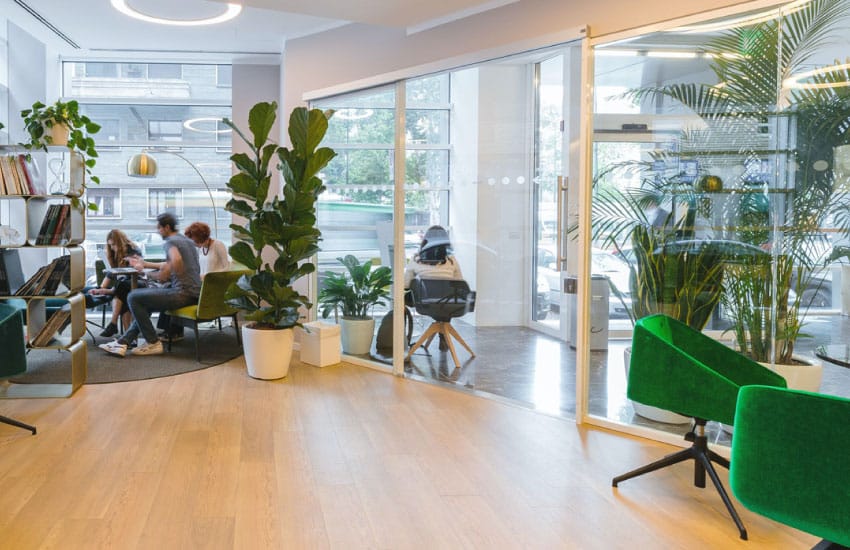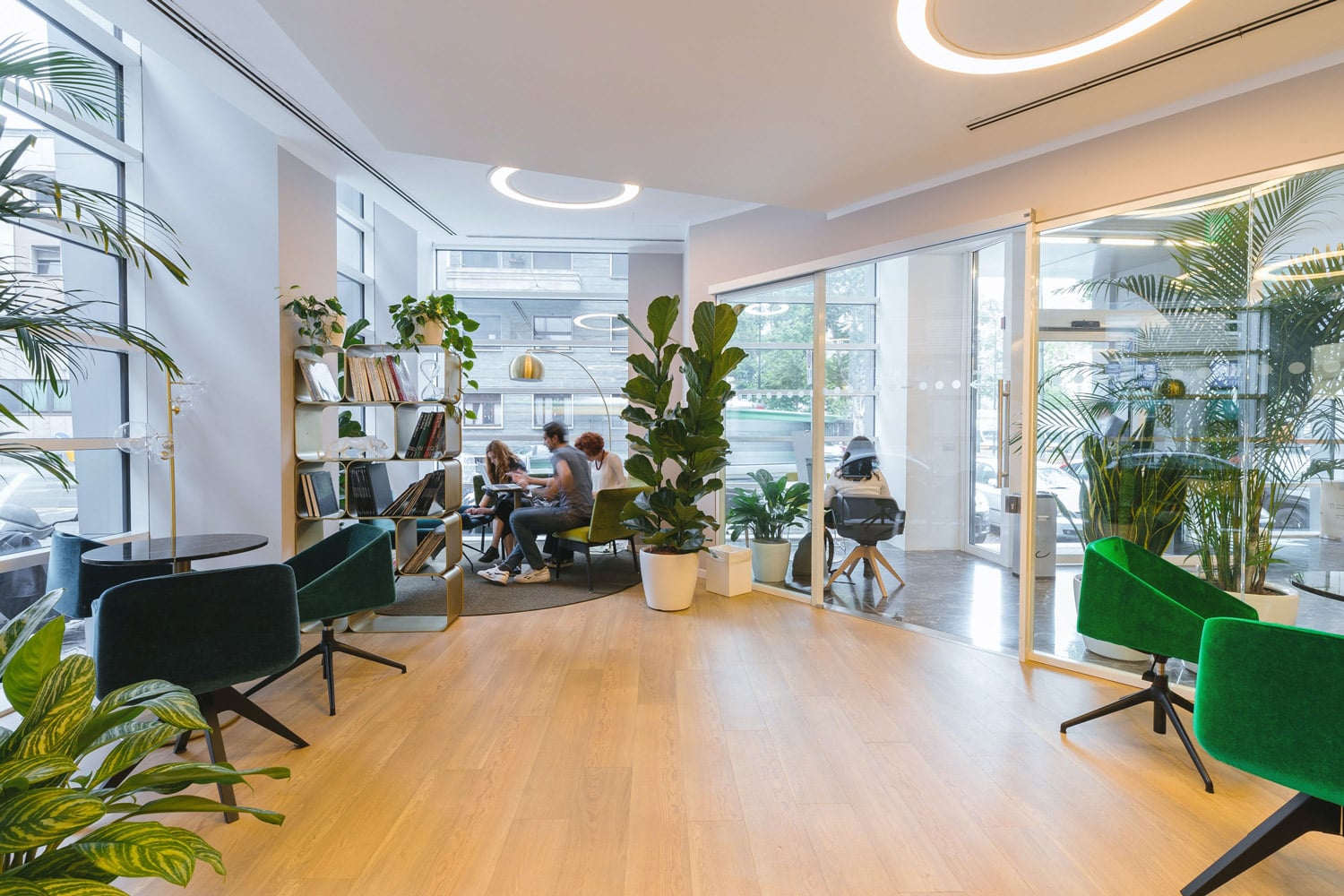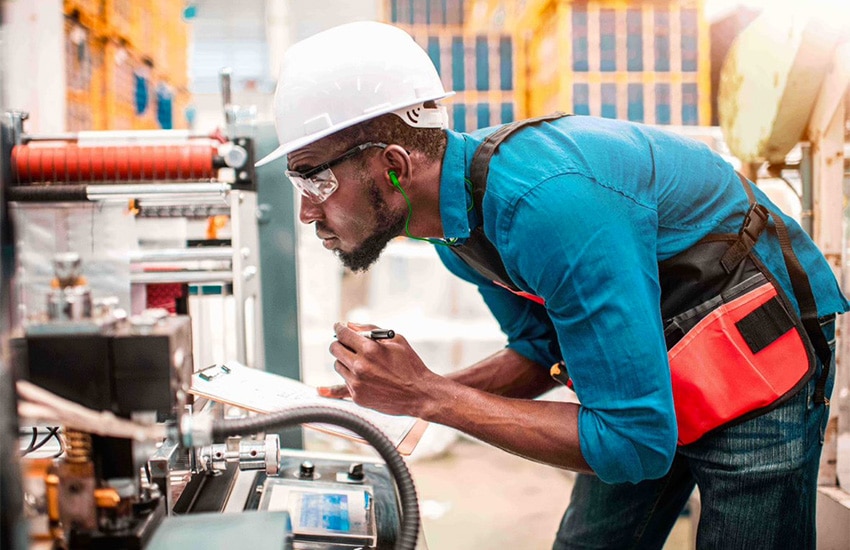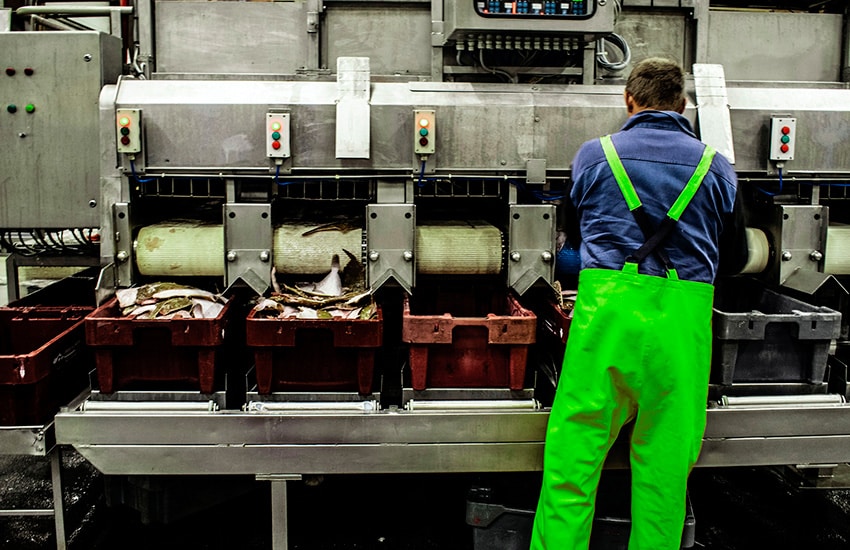17/05/2021
Several trends are driving the emergence of smart buildings: cost savings, safety improvements, a people-centric experience, and the need to get on board the sustainability wagon. What’s more – less of a trend than a responsibility – commercial and industrial spaces must now prepare for the reality of a post-pandemic world.

But both BC and AC (before and after Covid), sustainability has been a leading priority within these business trends. Increasingly, and in some industries more than others, there’s pressure both external (from governments, NGOs, regulators, and accreditation bodies) and internal (from employees and stakeholders) for companies to become greener, bolstering their recycling initiatives and reducing their carbon emissions.
In fact, despite the economic challenges thrown up by the pandemic, businesses and individuals have shown a renewed commitment to sustainability.
According to recent Gartner survey data1, more than 90% of executives in enterprises with a sustainability program report that sustainability investments are increasing.
Across the business world, there are now plenty of examples of companies incorporating practical sustainable initiatives. Even in unexpected industries like retail and fashion, green proposals are taking hold. For example, Inditex, the parent company of clothing retailer Zara, recently vowed that 100 percent of the cotton, linen and polyester it uses will either be sustainable, organic or recycled by 2025. In addition, the company is aiming for all its head offices to earn the top green certification for buildings in the coming years.
But not all organisations are quite so forward-thinking when it comes to sustainability. Aside from the reputational damage of poorly implemented green proposals, businesses can face immediate financial drawbacks. Across various markets, regulators have issued huge fines to firms that fail to comply with environmental legislation.
Sustainability is not easy to get right, but technology can offer a helping hand. By utilising sensors and smart technologies at your organisation, you can combine existing systems with new IoT devices and intelligent algorithms that deliver benefits for your employees and the environment.
Why sustainability matters
Sustainability is no longer simply a box-ticking exercise that organisations indulge in to boost their CSR reputation. It is a priority that has an impact across different levels of the business. Some of the most important considerations are:
- Ambitions and targets imposed by local, national and supranational governments. Agreements like the European Green Deal, the Paris agreement, and the UN Sustainable Development Goals encourage businesses to take ESG targets more seriously.
- External pressure from customers and stakeholders. Today, environmental considerations play a huge role in the products and services that consumers choose. Recent research has even shown that this has become an increasingly important factor post-Covid. In fact, 54% of consumers are now willing to pay a premium for brands that are sustainable and/or environmentally responsible.
- Your competition. Businesses that do not embrace sustainability will increasingly be seen as “the odd ones out” in their industries. Only a week ago, GM published its sustainability report – just one of the hundreds of companies taking such measures to demonstrate they are environmentally conscious.
- Your employees. People want to work for a company that walks the talk. According to research undertaken by IBM, 48% of employees would even accept a lower salary to work for an environmentally responsible organisation.
- Cost. Ultimately, investing in the future can lead to significant business growth. Reducing your carbon footprint, managing waste better and embracing energy efficiency can reduce your business costs over time.

How to use smart technologies to drive sustainability
Use case 1 – Optimising Energy Use
Regardless of the kind of building (whether it’s an office, a factory, or a shopping mall), being able to schedule and activate the air conditioning and lighting systems according to occupancy, daylight availability and time in the day can deliver immediate benefits – especially in a post-pandemic world, where the use of certain installations is still limited from place to place.
In the past, the management of heating, ventilation and air conditioning (HVAC) systems was straightforward – it was either on or off! Nowadays, we see the need to match HVAC with occupancy and create zoning solutions that improve comfort and cost. Again, these all can start with collecting and processing the right data throughout the building. Combining all data inputs from Computer-Aided Facilities Management (CAFM), energy consumption, environmental sensors, occupancy and more will create a rich environment for AI to enhance sustainable maintenance solutions.
Use case 2 – Waste Management
In today’s world, the slogan: “Think before you print this document” no longer seems to cut it. The type of waste your business produces will vary depending on your industry but one thing is for sure – there’s plenty of it.
Managing waste is extremely important if organisations are to optimise their resources and derive operational efficiencies. The first step to improving your waste management is gaining visibility. Tracking your waste, and understanding the patterns of behaviour that create it, allows you to implement policies to reduce waste and increase awareness among your employees.
Smart waste management solutions, with sensors placed in waste receptacles to measure fill levels, can notify cleaning teams and collection services when bins are ready to be emptied. Over time, historical data collected by these sensors can be used to identify fill patterns, optimise schedules, and reduce operational expenses. The cost of these sensors is steadily decreasing, making IoT waste bins more feasible to implement and more attractive to building owners, facilities managers or even city leaders.
Use case 3 – Sustainability Dashboards
Businesses can only assess the effectiveness of their sustainability efforts if they collect data on their environmental outputs. The fact that integrated smart technologies (like IoT sensors) can help businesses to track their use of energy and resources, measure efficiency gains, and monitor data over time enables business leaders to measure building functionality and identify possible areas for improvement.
Smart buildings can also help with long-term strategic decisions regarding the amount of space needed, the type of space required to match user needs and the services needed to support them. Sustainability is no longer a nice-to-have; it is essential to business success – now, more than ever as we enter a post-Covid world. The exact nature of your sustainability journey in this uncertain future may be impossible to predict, but smart technologies can help you every step of the way.
With Getronics as your integration partner, you’ll benefit from a single smart solution capable of managing your entire built environment. Talk to our experts today about how we can support you in the creation of a future-proof business that puts people and sustainability at its core.




